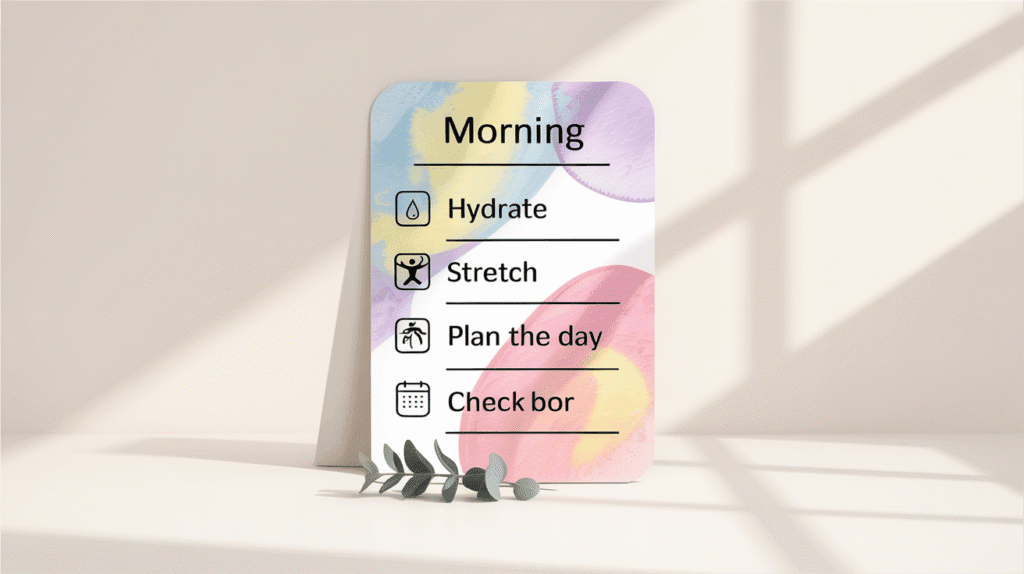
Starting your day with energy and clarity isn’t just a nice idea — it’s one of the most powerful advantages you can create for yourself. A strong morning routine builds momentum that carries you through work, challenges, and decisions more smoothly. It’s like setting a positive tone that echoes through every hour ahead.
Yet, many people unknowingly sabotage their mornings through small, hidden mistakes. These aren’t dramatic failures or obvious blunders; they’re subtle choices that, over time, sap motivation, increase stress, and make success feel harder than it needs to be.
The good news? You don’t need a total overhaul. Often, just fixing a few invisible leaks is enough to transform how you start — and live — your day. In this article, we’ll uncover the most common silent killers of a great morning routine and show you simple, science-backed ways to fix them.
It’s tempting, isn’t it? The alarm blares, your bed feels extra warm, and the promise of “just five more minutes” seems harmless. But hitting snooze is more damaging than it feels — it silently kills the momentum your brain needs to start the day strong.
When you snooze, you fragment your sleep cycle. Instead of completing another restful phase, your brain gets jolted between light sleep and wakefulness, making you groggier and more disoriented. This phenomenon is called sleep inertia, and it can impair cognitive performance for hours.
Psychologically, snoozing sends a powerful signal: today’s first decision was avoidance. It teaches your brain that delaying discomfort is acceptable, setting a subtle tone of procrastination that can ripple through the entire day. Small choice, big consequence.
How to break the snooze cycle:

Waking up without a clear plan for the morning is like stepping into a battlefield without armor. Without structure, your mind immediately shifts into reactive mode — responding to distractions, minor urgencies, and random thoughts instead of following a meaningful direction.
The danger isn’t just feeling scattered. Mental energy is limited each day, and when you waste it early on making small, unimportant decisions (like scrolling aimlessly or wondering what to tackle first), you deplete your focus for tasks that actually matter later. Scientists call this decision fatigue — the gradual erosion of your ability to make good choices as the day progresses.
A strong morning plan doesn’t have to be rigid or complicated. A simple 3-step mental checklist like “hydrate, move, review goals” gives your mind a clear script to follow without overwhelming it. When you start the day on offense instead of defense, everything else flows easier.
Quick tips to create a basic morning plan:
One of the most overlooked secrets of a powerful morning is exposing yourself to natural light and gentle movement shortly after waking. Your brain isn’t fully awake just because your eyes are open — it needs environmental cues to shift into full alertness mode.
Natural sunlight triggers your brain to halt melatonin production (the sleep hormone) and kickstart cortisol (the alertness hormone) in healthy doses. Without this signal, your body stays in a foggy, sluggish state for much longer than necessary. Similarly, even mild physical movement — like stretching, walking, or doing a few yoga poses — boosts blood flow, wakes up the muscles, and sharpens mental clarity.
Ignoring these simple activators often leads to feeling “off” for hours without understanding why. You might blame coffee needs or poor sleep when, in reality, you’re missing the natural switch that tells your system, “It’s time to go!”
Small ways to add light and movement to your morning:
When motivation is high, it’s easy to overstuff your morning routine with ambitious goals: 30 minutes of meditation, journaling, a workout, reading, meal prepping — all before 8 a.m. It sounds impressive, but overcomplicating your mornings often backfires.
The brain craves simplicity, especially right after waking up. When your routine demands too much early mental or physical energy, it creates friction and stress instead of flow. Instead of feeling accomplished, you start associating your mornings with pressure — and eventually, resentment or burnout.
Minimalist routines often outperform complex ones because they are sustainable. A 10-minute sequence you actually complete every day will transform your life far more than a 90-minute monster routine you abandon after two weeks. Consistency beats intensity, every time.
How to simplify your morning routine:

A great morning routine isn’t built through complicated systems or bursts of discipline — it’s shaped by simple, intentional choices that honor how your brain and body truly work.
By recognizing the hidden mistakes that quietly sabotage your mornings — like snoozing alarms, starting without a plan, skipping light and movement, or overloading your schedule — you gain the power to design mornings that feel energizing instead of exhausting.
You don’t need to be perfect or rigid. A few thoughtful adjustments can shift your entire day toward more focus, better decisions, and greater satisfaction. Start small, stay consistent, and watch how better mornings quietly build a better life.

Daniel Carter believes that small daily changes lead to extraordinary results. Through simple and effective strategies, he inspires readers to take control of their routines, overcome procrastination, and unlock their full potential.